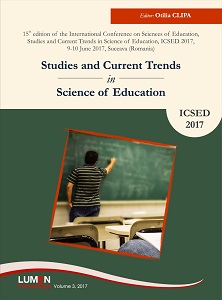The Advantages of Collaborative Learning in Science Lessons
The Advantages of Collaborative Learning in Science Lessons
Author(s): Ana Maria Aurelia Petrescu, Gabriel Gorghiu, Luminiţa Mihaela Drăghicescu
Subject(s): Social Sciences
Published by: Editura Lumen, Asociatia Lumen
Keywords: collaborative learning; collaboration; cooperation; teamwork; IRRESISTIBLE project.
Summary/Abstract: The concept of collaborative learning, as well as the cooperative learning one, is quite commonly invoked in the educational policy documents of the last decades. The collaborative learning is regarded as an operating principle of modern education and training, based on the idea of democratization of education, and also on its anchoring in the social or community issues. The school and the classroom represent a learning environment where the child socializes, as a result of developing various types of relations: inter-knowing, inter-communication, collaboration, influence etc. On the other hand, from the praxeological perspective, the collaborative learning is seen as an interactive strategy, a participatory one that promotes teamwork, roles assuming, constructive exchange of ideas and personal involvement, in relation to each personality when developing a joint product. In the present study, we aim to express the advantages of the collaborative learning in Science lessons (Physics, Chemistry, Biology), concomitant with the identification of its limits. The analysis was performed in the frame of the FP7 project entitled: “IRRESISTIBLE – Including Responsible Research and Innovation in Cutting Edge Science and Inquiry-based Science Education to Improve Teacher’s Learning Ability of Bridging Environments”, on a sample of 30 students from lower and upper secondary levels, based on a questionnaire survey. The students’ feedback correlated with data derived from teachers’ observations revealed that the collaborative learning represents a favorable context for engaging students in the development of their own knowledge, in order to achieve sustainable acquisitions and increase their motivation and interest for Science.
Book: Studies and Current Trends in Science of Education
- Page Range: 326-333
- Page Count: 7
- Publication Year: 2018
- Language: English
- Content File-PDF

